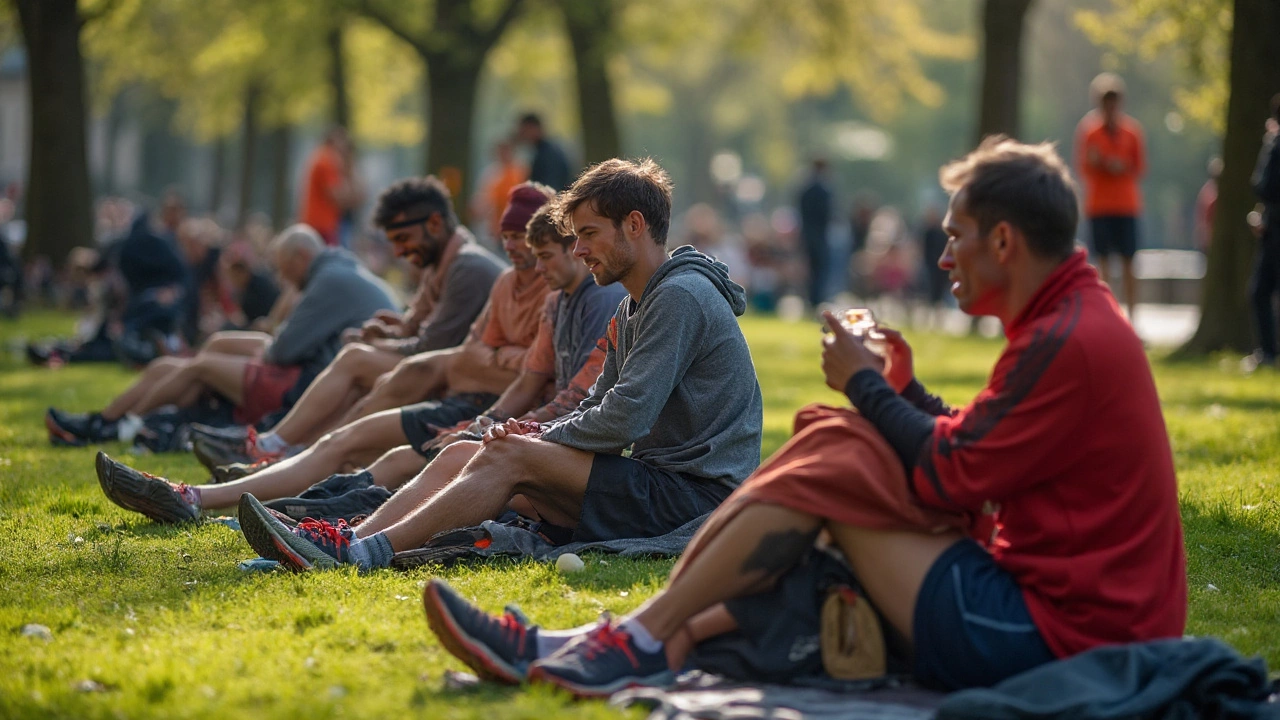What Happens to Your Body 48 Hours After Running a Marathon? Recovery Explained
 Aug, 7 2025
Aug, 7 2025
Crossing the marathon finish line feels epic for about five minutes. Then reality crashes in—your legs shake, your stomach flips, and you start to wonder: what’s actually happening inside my body right now? The next 48 hours aren’t just about sore calves and bragging rights. Marathon recovery is a rollercoaster with some surprising twists most people never see coming.
The First Few Hours: Shockwaves Through Your Muscles and Mind
Your body has just burned through roughly 2,600–3,800 calories, depending on your pace and size. Imagine emptying a full tank of gas in three to five hours. Glycogen—the fuel stored in your muscles—tanks out, and your legs instantly know it. Right after you stop, that sudden switch from motion to rest messes with your blood flow. The lactic acid built up in your muscles doesn’t magically disappear, so cramps and heaviness set in fast.
Ever notice how the pain kicks up a notch when you finally sit? Blood starts to pool in your lower limbs, making them feel like anchors. Within hours, you can be colder than normal even if it’s a warm day. Your immune system also drops its guard, which is why catching a cold post-race isn’t just bad luck—it’s biology.
| Factor | Immediate Effect |
|---|---|
| Calories Burned | 2,600–3,800 |
| Glycogen Storage | Nearly depleted |
| Core Temperature | Decreases quickly |
| Immune Function | Suppressed for 3–72 hours |
| Muscle Microtears | Begin during final miles |
It’s not just your muscles feeling battered. Even your brain chemistry shifts—it’s why you might crash emotionally after the race-day high. Pro tip: drink a recovery shake within 30 minutes and keep walking for at least 15 minutes after the finish. It helps smooth the transition from race to rest. And seriously, don’t just grab a beer—your body needs real carbs and protein now to start basic repairs.
Muscle Damage, Soreness, and Inflammation: The Next Day’s Price
About 12–24 hours after the marathon, delayed onset muscle soreness (DOMS) comes on strong. It's not just the feeling of tired legs. Your muscle fibers have hundreds of microtears—tiny injuries from all those pounding steps. Picture every step times 42,195 meters; that’s over 55,000 foot strikes for most runners. Now, each of these shocks has shaken your legs, hips, and even your arms. Your immune system leaps in to help repair the damage, flooding the area with white blood cells and inflammation. This is what actually causes the swelling and pain, more than the lactic acid you feel up front.
Levels of creatine kinase (CK)—an enzyme released when muscles are damaged—can spike to five times their normal level. Blood tests on marathoners show CK peaking anywhere from 24 to 48 hours after the run. That explains why sometimes you feel even worse on day two than right after the finish. There’s no way around it: ice baths, gentle stretching, and easy movement (think: a slow walk, not a jog) make a difference. And those pain relievers? Ibuprofen works, but don’t overdo it—your stomach and kidneys are also still in fragile post-marathon mode.
Inflammation does more than hurt. It can slow digestion and pump up your heart rate even at rest. That’s why tossing and turning the night after a marathon is so common. You’ll probably notice swelling in your ankles or even your hands—gravity’s working against your circulation as your whole system tries to get back to baseline. Compression socks can help here, but the best remedy is time and patience. Want a weird-but-true recovery tip? Mix anti-inflammatory foods like pineapple, turmeric, or cherries into your meals. There’s good evidence natural compounds can dial down the pain a notch or two—worth a shot if you’re not into meds.

Dehydration, Electrolytes, and the Stories Your Urine Tells
Most runners finish a marathon at least slightly dehydrated. Your body spits out two to four liters (half to a whole gallon) of sweat during the race, sometimes even more in hot weather. Thirst doesn’t always work like a gas tank light—so you might not feel thirsty until hours later. The results are obvious: killer headaches, dizziness, and that shaky, hollow feeling. Your urine might even change—dark color is a big warning sign you need fluids fast.
Here’s where sodium, potassium, magnesium, and calcium matter. Ignore them and you risk muscle cramps, headaches, or even a midnight emergency room run. It's not about chugging gallons of water; you need to balance it with salty foods or drinks like sports beverages, broth, or coconut water. Too much plain water can flush out the sodium you do have, and that’s when “hyponatremia” (water intoxication) happens. About 13% of marathon runners end up with abnormally low sodium after big races, according to data from the London Marathon. It sneaks up as nausea, confusion, and, in rare cases, even seizures.
- If you're peeing clear every half hour, you’re probably overdoing it on plain water.
- Salt cravings? Listen to them—they’re legit after 26.2 miles.
- Adding electrolyte powder to your drinks can help. It’s not just for elite athletes.
One more thing—some runners see a bit of blood in their urine post-race. Scary, but most times it’s caused by the bladder bumping against itself during all the running. It usually clears up in a day or two, but if it doesn’t or if you feel any pain, check with a doctor.
Immune System on Slow-Mo: Why You Get Sick After a Marathon
Your immune system is running on fumes after a race. Cortisol—the stress hormone—shoots up during endurance events. It’s your body’s way of handling all that trauma, but high cortisol drops your defenses against viruses and bacteria. There’s a reason why marathon runners get two to six times more colds and respiratory infections in the week after their event. If you find yourself sniffling, sneezing, or feeling wiped, it’s not because the weather changed. It’s because your immune system is letting its guard down after working overtime for hours.
If you’re prone to cold sores, breakouts, or mild fevers post-marathon, you’re not alone. Some studies even found that the T-cells (your body’s virus and bacteria fighters) can stay suppressed for up to three days after an intense run. There are a few things you can do:
- Wash your hands more often—seriously, don’t skip this step.
- Eat vitamin-rich foods; oranges, berries, and leafy greens are your friends now.
- Don’t share drinks, towels, or gear in the finish area. Germs spread fast there.
- If you’re feeling run-down, sleep as much as you can. Sleep fuels immune recovery as much as food does.
This immune dip is normal, but sometimes the signs look like post-race blues or just lingering soreness. If you feel unusually sick, check in with a doctor. And if you get a fever over 101°F, listen to your body and rest. No one gets a prize for returning to training too soon.

Pacing Your Comeback: Smart Recovery in the 48-Hour Window
The next two days are the secret zone between quick healing and dragging out the pain for weeks. Some runners feel invincible and jump into a workout—big mistake. Your body is still repairing every tissue, from your gut lining (yep, that’s why some runners fight stomach cramps) to your heart and kidneys (both work double during the race).
Easy does it. Prioritize sleep, light stretching, gentle walks, and lots of fluids. A 2022 review found that runners who took 48–72 hours fully off had fewer injuries and returned to training faster than those who rushed back. If you’re itching to get moving, try foam rolling or a gentle swim—no pounding on the pavement yet. And yes, post-marathon appetite is real. Grab balanced meals with carbs, protein, and healthy fats. Your body is rebuilding muscle, liver, and even brain tissue.
- Don’t ignore weird aches that last more than three days—they might signal more serious damage than regular soreness.
- Listen to your sleep patterns. If you’re constantly tired, stretch your recovery out longer.
- Pro sports therapists swear by alternating hot and cold showers to boost circulation. Worth a shot for getting rid of that heavy-leg feeling.
- Be kind to yourself: take work, social events, and future races easy in these first 48 hours. It’s part of building real marathon fitness, not a sign of weakness.
One thing’s for certain: your first days after a marathon are wild—emotionally, physically, and mentally. If you treat your body with respect, you’ll bounce back stronger and maybe even ready to plan your next race sooner than you think.